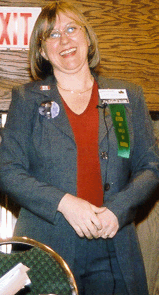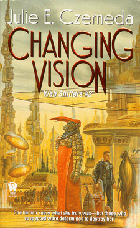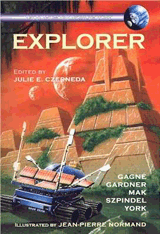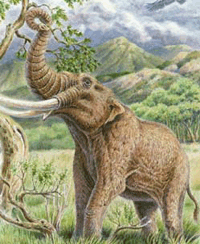  | ||||
HOME |
Seeking a Sense of Wonder 
I had the opportunity to talk to Julie Czerneda on February 9, 2002 at Ad Astra, Toronto's annual SF convention, where she was the author guest of honour. [Photo taken by Lynda Ciaschini at Julie's guest-of-honour hour.] Throughout the convention, she seemed to be at the top of her game, in one moment sharing an amusing story or a quirky observation, in the next keeping a rowdy room in check with her schoolteacher-voice. At one point in the interview, Guy Kay walked up and interrupted, knowing perfectly well we were doing an interview, trying to put her off balance just to see her reaction. But she laughed it off easily and continued without really being distracted. Do you believe that science fiction should play a role in education? Yes, I do. It's very important that kids read science fiction in a way that promotes their understanding of education, and not just blind acceptance; science fiction is a wonderful tool for that. It's also such great literature for the mind, as far as learning to read it, and you need to learn to read it young. So I would like to see more of it in the educational system. How do you think science fiction, in an educational context, works differently from other literary forms that kids are exposed to? There's no other literary form that they're exposed to that goes after science and technology as it exists today, as it might exist in the future. They're exposed to literature that talks about coming of age, adventure, mystery, and social issues. And even the social issues are better treated by science fiction in many cases. There's more daring settings than they can explore in regular literature. So it's very underused, and I think you will see SF used more and more as people come to realize that.
Oh, absolutely. The study of animals, animal behaviour, and chemical communication is the key to pretty well everything that I write. I like exploring those things. Every one of my books has an underlying biological premise. If you couldn't be a writer, for whatever reason, what would be your choice of career? I was a research biologist before; I would probably continue in that. Certainly that kind of "sense of wonder" in science is what I seek in the writing and the reading, so I would probably go in that direction. Did you ever think about anything else? I think I was in grade 2 when I first wrote down "research biologist" and everyone said, "Do you want to be a vet?" And I said, "No, I want to be a research biologist." Actually, I did start university with a joint minor in physics, because I also thought biophysics, but I was about 10 years ahead of the curriculum being organized so I could do both. I could have taken environmental studies and biology, but not physics and biology. So I have a little interest in physics as well. How is it different writing for a young adult audience as compared to an "adult" market? Is there anything you can't do, or that you can do, in a young adult genre?
There's also [the need for] making things clear. There's no point setting a story where you're relying on the reader having the knowledge of an adult. You can't just throw in the Cold War and expect them to grasp it. On the other hand, you have to watch that you don't date the book. Kids change their fads more quickly than you can imagine. So in many ways you have to have very classic themes to your story. And you have to watch the emotional tone. Kids don't want to be patronized for sure, but they're also very emotionally attached when they read. I think you have to watch that you don't get too dark on them; you have to make sure there's some kind of hope, or a direction that things can take. How has being a Canadian influence your writing? I think it's influenced it tremendously, apparently. There's a bit of a tricky question, not having been able to not be a Canadian and write, in the sense that I wouldn't know how to start writing other than what I am. But I can answer from looking from my editor's point of view: there's always a little surprise that my characters negotiate their way out of trouble, or find another solution. There's very little violence in my books, and there's an awful lot of making do, accommodation, that sort of thing. And I find it much more interesting to try and work around differences and accommodate them, very much as we see in Star Trek, that kind of coping. It's not that everybody has to be the same; it's that we've learned to deal with everybody's differences in a way that enhances their lives. Is there a perspective that you bring from living in small towns, or moving from place to place? What do you find easier as a result of that background? I'm very good at writing hockey! I grew up on air force bases, and then we moved to Mississauga, so the small town has been very recent. If anything, it's a very bizarre setting to me sometimes, and I write about it from that point of view. Whatever makes me laugh about people tends to end up in my books. How did you choose stories for Tales from the Wonder Zone? It was more a case of choosing authors. I knew the science topics, because Tales from the Wonder Zone thus far was a series designed to be of practical use in classrooms as well entertaining reading. I knew the five major topics that would be taught in each of grades 4, 5 and 6, because I've worked on the pan-Canadian science curriculum and I know the US science curriculum. They all learn about weather, about structure, about the properties of matter. So I listed those topics and sent them out to the authors I was inviting, and I said, "Please pick." They of course were not cooperative and did not all pick different topics, so we negotiated. In some cases I have more than one story about light, because light was important to a lot of people, so that's how we did it. As a nominee for the Philip K. Dick and the John W. Campbell awards, you're included with some illustrious company. Who are some of your favourite authors, and who has influenced your writing? C.J. Cherryh is probably my top favourite; I will read everything by her. Tanya Huff and Lois Bujold are also favourites. I grew up reading Andre Norton and Isaac Asimov. I have a lot of Keith Laumer; I love the Retief stories.
When you write about alien characters, what's the most important thing you want to communicate? What's the most fun part about writing these characters? The aliens that I write, I usually start by writing to a purpose. If I need a character that is going to be a custodian, I'm going to make them look a bit like a vacuum cleaner. I like to reverse-engineer them, the way things are in our world where we have a niche; I like my alien characters to fit a niche that's believable too. That being said, they have to have a place where they would be normally found, and food they would normally eat. The way they interact with others and what bugs them—all that has to be there so that they're believable. They can be really strange, but there has to be a sense that this could happen, that this strange thing could be there. Given your background in the sciences, maybe you can make some predictions about the future. What do you think will change in Canada, or around the world, over the next century? Oh, not even a century, I think that the pace of change is so fast. One of the things that we're going to see is the things we are capable of doing and that we will be capable of doing in biology will fundamentally change how we interact with other living things, how we deal with ourselves, our lifespans, the way we want to live. And biology will have an impact at such a personal level for everyone. We can choose to use technology or not to, but when stuff is going into your mouth, it affects you and you can't get away from it. I think we're going to find that ethical issues, and making decisions as a society about the kind of world we want to continue to live in, are going to become more important, and people are going to have to be able to make those decisions. And it's going to be very interesting, and we're going to have to deal with it more as a world with some of these, because what we're saying we won't do, someone else will be doing. We can't just hide our heads in the sand and say it's not happening, because it will. And I don't see that as a bad thing; I think there's an amazing possibility in finally understanding living things, and how we fit in and how we are going to live in the world. More specifically, for example? All I can think of is that wonderful moment in The 6th Day [2000] when they have the place where you can have your dead pet cloned. I certainly see, not to use cloning as a particular example, but the ability to bioengineer. I think that there'll be bioengineering at a level where people don't actually consider these things to be life, and then all of a sudden they will be, so then we'll end up finding our definition of life to be expanding. Also finding life in other places, and how that will affect things. Beyond that, I think that we'll be seeing some climate control coming that's biologically based. I think we'll be seeing a lot more robotics involved in agriculture. I think we'll be seeing a lot more diversity in the plants that we grow, and a tendency to grow locally more extraordinary plants, so that we're not shipping things around the world. We probably won't be able to go into the oceans for a while, until they recover, and then the development of sea parks will become very crucial in keeping living things going.
| |||
Interviews, Speeches, Articles | Voyageur Home Upcoming Events & Conventions | Club History Main Site Editor & Site Problems IDIC Home Copyright © 2002, Infinite Diversity International Corporation. All rights reserved. | ||||

 Is there a connection between your studies of animals and biology and your writing about aliens?
Is there a connection between your studies of animals and biology and your writing about aliens? Definitely. I don't actually write young adult stuff. I edit it, so I buy work that's written for young adults. And I come to that as an editor knowing the requirements in the classroom, and from parents and what they want to see kids reading. So you have to be sensitive to [certain issues]. Certainly you have to have a gender balance; you can't just have only female or male protagonists. You've got to have something to appeal to every kid.
Definitely. I don't actually write young adult stuff. I edit it, so I buy work that's written for young adults. And I come to that as an editor knowing the requirements in the classroom, and from parents and what they want to see kids reading. So you have to be sensitive to [certain issues]. Certainly you have to have a gender balance; you can't just have only female or male protagonists. You've got to have something to appeal to every kid. There are writers whose work I read, and I sort of gasp and say, "Wow, wouldn't it be nice to do this!" Among those people is certainly Patricia McKillip, because she can write using the most simple words and make such amazing pictures with her writing. And I've always admired CJ's ability to create such depth to her cultures without intruding on the story line. Some people find that she does more than she should, but I don't think so. I find [that] the worlds she builds hold together, and that's why the characters work so well. And there's many others that you read a turn of a phrase or the way they do things and you say, "Wow, how'd they do that?"
There are writers whose work I read, and I sort of gasp and say, "Wow, wouldn't it be nice to do this!" Among those people is certainly Patricia McKillip, because she can write using the most simple words and make such amazing pictures with her writing. And I've always admired CJ's ability to create such depth to her cultures without intruding on the story line. Some people find that she does more than she should, but I don't think so. I find [that] the worlds she builds hold together, and that's why the characters work so well. And there's many others that you read a turn of a phrase or the way they do things and you say, "Wow, how'd they do that?" And I think one day we'll be complaining about other living things the way we complain about the geese now. I think we will repair some ecosystems so that they're back the way they were before. Then we'll be quite crowded, and we'll be wondering, do we want the passenger pigeon restored? And somebody will, definitely, produce a functioning mastodon from material they're working on; it may look very strange and be very lonely, but they'll do it.
And I think one day we'll be complaining about other living things the way we complain about the geese now. I think we will repair some ecosystems so that they're back the way they were before. Then we'll be quite crowded, and we'll be wondering, do we want the passenger pigeon restored? And somebody will, definitely, produce a functioning mastodon from material they're working on; it may look very strange and be very lonely, but they'll do it.